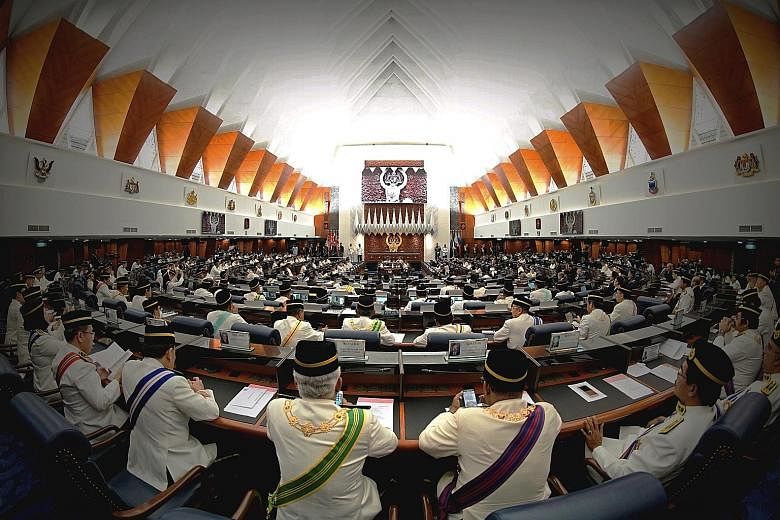The goodies expected in Friday's Budget and the fate of a controversial Islamic Bill are the two key issues under scrutiny as Malaysia's Parliament begins its six-week session today, ahead of the general election which is expected to be called in the next five months.
After months of on-again, off-again speculation over the date of the national ballot, pundits say that will be put on the back burner for now as everyone tries to anticipate what Prime Minister Najib Razak, who is also Finance Minister, will unveil in the 2018 Budget.
He is expected to stuff it with vote-grabbing measures to douse increasingly bitter complaints about the cost of living, while securing his traditional vote banks such as the 1.2 million settlers and their families in the government's Felda land scheme and the 1.6-million strong public sector.
This Budget is crucial as the ruling Barisan Nasional (BN) coalition hopes to blunt the march of the opposition, which has had two strong elections in 2008 and 2013.
"I know many of you are waiting for certain announcements. God willing, I will deliver some good news in the Budget. Please be patient," Datuk Seri Najib said at a meeting with civil servants earlier this month.
Friday's Budget will be his ninth as Prime Minister and Finance Minister of South-east Asia's third biggest economy in April 2009.
The current sitting could also feature a controversial Bill that has divided MPs and Malaysians alike.
The private member's Bill by Parti Islam SeMalaysia's (PAS) president Abdul Hadi Awang pushes for more sentencing powers for Malaysia's syariah (Islamic) courts.
Called the Hudud Bill by its critics, it proposes to amend the Syariah Courts (Criminal Jurisdiction) Act, also known by its Malay acronym RUU355.
The syariah court today can mete out what is called the 3-5-6 punishment, that is, imprisonment of up to three years, a RM5,000 (S$1,600) fine and six strokes of the cane. RUU355 will raise these to a maximum punishment of 30 years' prison, a RM100,000 fine and 100 strokes of the cane. These are viewed by non-Muslims and a section of Muslims as opening the door to hudud, the Islamic criminal code that prescribes stoning and amputation as punishments.
What is worrying for critics is that Umno let Datuk Seri Hadi, an opposition leader, table the Bill in the last parliamentary session and had argued in support of it. But debate was then abruptly postponed.
This was interpreted by analysts as part of a strategy by Umno to cause a further rift between PAS and the other opposition parties that oppose the Bill.
With the general election just months away, even PAS now seems unsure over whether to push the Bill forward. And, as the clock ticks closer to the polls, there is clear hesitancy to wade into issues of race and religion by everyone.
Unlike before, no Umno leader has spoken in support of the PAS Bill in recent weeks.
According to Mr Lau Hoi Keong, a Kuala Lumpur leader of BN member party Gerakan, PM Najib at a meeting of coalition leaders last Saturday told them to avoid being "extremist and very racist".
An example was the huge storm over the Muslims-only launderette in Johor and Perlis: both Umno and PAS leaders kept quiet for two weeks. Only on Saturday did PM Najib speak about the issue, saying: "I don't believe in exclusivity, let there not be a launderette only for Muslims. I think that's wrong."
Sociopolitical analyst Eddin Khoo said: "This launderette issue is a clear indication that politics of race and religion is getting exhausted. There is a sense of exasperation and embarrassment, even among devout Muslims, that serious issues of policy and governance are not being addressed, and instead, we are being told nonsense about hygiene."
This Parliament session will continue until Nov 30. The House usually reconvenes in March, but there is growing expectation that polls will take place after Chinese New Year in mid-February. Parliament will automatically disband in June and the Election Commission then has two months, until August, to set an election date.

